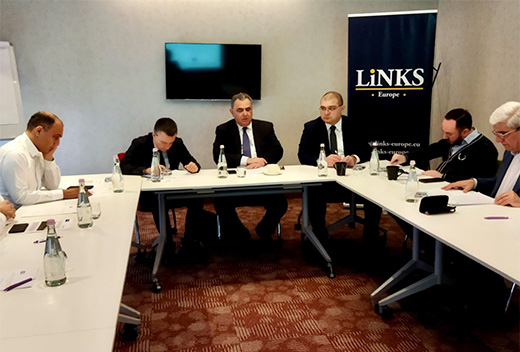News
Donbas: Why Russia is trying to encircle Ukraine's east Russia has moved most of the focus of its war to eastern Ukraine, after pulling back its forces from near the capital Kyiv. Ukraine's leader Volodymyr Zelensky says the battle for the area known as Donbas has begun and a very large part of Russia's army is taking part.
Publications
The South Caucasus from War to Peace: 30 Measures between Now and 2030  Joint Armenian-Azerbaijani Liaison Group on confidence-building measures
Joint Armenian-Azerbaijani Liaison Group on confidence-building measures
The Joint Armenian-Azerbaijani Liaison Group on confidence-building measures in support of lasting peace in the South Caucasus has published its report in which it proposes 30 short, medium and long term measures in support of ongoing efforts to establish peace in the region. On Wednesday, 6 April, members of the Working Group, presented their report to the EU Special Representative for the South Caucasus, Toivo Klaar, and other EU officials at a special briefing in Brussels. In their report, published on the eve of the meeting between the leaders of Armenia and Azerbaijan and the president of the European Union in Brussels on 6 April, the group says that "all the ingredients for peace exist in the South Caucasus. All the ingredients for war exist too. What is in front of us is a choice". The group says that the proposed measures are a building block in the quest for peace but if the ideas being proposed are implemented the objective of building a peaceful, secure and prosperous South Caucasus will be much closer to being achieved. It was now necessary that all concerned should put effort into turning the thirty measures being proposed in the report into tangible action.
The work of the Joint Liaison Group was co-ordinated and facilitated by LINKS Europe - an independent foundation based in The Hague, The Netherlands - in the framework of the European Union's EU4Peace initiative. READ MORE
Publications
New Meeting between Pashinyan and Aliyev in Brussels: What next  By Benyamin POGHOSYAN, PhD, Chairman, Center for Political and Economic Strategic Studies
By Benyamin POGHOSYAN, PhD, Chairman, Center for Political and Economic Strategic Studies
On April 6, 2022, Armenian Prime Minister Nikol Pashinyan and Azerbaijani President Ilham Aliyev held a meeting in Brussels mediated by the President of the European Council, Charles Michel. It was the second meeting in Brussels mediated by the European Union. The first took place in December 2021; on February 4, 2022, Armenian and Azerbaijan leaders held an online meeting with the participation of Michel and French President Emmanuel Macron. A week before the April 6 meeting, the EU hosted a meeting of high-level officials from Armenia and Azerbaijan in Brussels to advance joint efforts to find solutions to issues between both countries. The meeting between Secretary of the Security Council of Armenia Armen Grigoryan and assistant to the President of Azerbaijan Hikmet Hajiyev was facilitated by the EU Special Representative for the South Caucasus Toivo Klaar. As a result of the April 6 meeting, Pashinyan and Aliyev agreed to instruct their Ministers of Foreign Affairs to work on the preparation of a future peace treaty, which would address all necessary issues. READ MORE
Publications
A Resumption of the Iran Nuclear Deal is also Good for Armenia  By Benyamin POGHOSYAN, PhD, Chairman, Center for Political and Economic Strategic Studies
By Benyamin POGHOSYAN, PhD, Chairman, Center for Political and Economic Strategic Studies
When President Trump pulled the US out of the Iran nuclear deal in May 2018, and launched his “maximum pressure campaign” against Tehran, the other signatories of the nuclear deal did not join the US and took steps to save the deal. The EU even launched a special trade mechanism – INSTEX - to facilitate non-USD and non-SWIFT transactions with Iran, while China continued to buy Iranian oil. The re-imposed US sanctions have significantly worsened the economic situation in Iran but have failed to reach the main goal – to force Tehran to change its regional policy and give up on its ballistic missile program. READ MORE
1
...
122
123
124
...
867